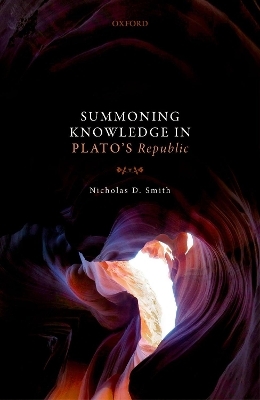
Summoning Knowledge in Plato's Republic
Seiten
2019
Oxford University Press (Verlag)
978-0-19-884283-5 (ISBN)
Oxford University Press (Verlag)
978-0-19-884283-5 (ISBN)
Nicholas D. Smith considers an original interpretation of the Republic, presenting it as a work about knowledge and education. Smith pays particular attention to Plato's use of images as representations of higher realities in education, as well as the power of knowledge in the Republic.
Nicholas D. Smith presents an original interpretation of the Republic, considering it to be a book about knowledge and education. Over the course of Summoning Knowledge in Plato's Republic, he argues for four main theses. Firstly, the Republic is not just a work that has a lot to say about education; it is a book that depicts Socrates as attempting to engage his interlocutors in such a way as to help to educate them and also engages us, the readers, in a way that helps to educate us. Secondly, Plato does not suppose that education, properly understood, should have as its primary aim putting knowledge into souls that do not already have it. Instead, the education Plato discusses, represents occurring between Socrates and his interlocutors, and hopes to achieve in his readers is one that aims to arouse the power of knowledge in us and then to begin to train that power always to engage with what is more real, rather than what is less real. Thirdly, Plato's conception of knowledge is not the one typically presented in contemporary epistemology. It is, rather, the power of conceptualization by the use of exemplars. And finally, Plato engages this power of knowledge in the Republic in a way he represents as only a kind of second-best way to engage knowledge - and not as the best way, which would be dialectic. Instead, Plato uses images that summon the power of knowledge to begin the process by which the power may become fully realized.
Nicholas D. Smith presents an original interpretation of the Republic, considering it to be a book about knowledge and education. Over the course of Summoning Knowledge in Plato's Republic, he argues for four main theses. Firstly, the Republic is not just a work that has a lot to say about education; it is a book that depicts Socrates as attempting to engage his interlocutors in such a way as to help to educate them and also engages us, the readers, in a way that helps to educate us. Secondly, Plato does not suppose that education, properly understood, should have as its primary aim putting knowledge into souls that do not already have it. Instead, the education Plato discusses, represents occurring between Socrates and his interlocutors, and hopes to achieve in his readers is one that aims to arouse the power of knowledge in us and then to begin to train that power always to engage with what is more real, rather than what is less real. Thirdly, Plato's conception of knowledge is not the one typically presented in contemporary epistemology. It is, rather, the power of conceptualization by the use of exemplars. And finally, Plato engages this power of knowledge in the Republic in a way he represents as only a kind of second-best way to engage knowledge - and not as the best way, which would be dialectic. Instead, Plato uses images that summon the power of knowledge to begin the process by which the power may become fully realized.
Nicholas D. Smith is James F. Miller Professor of Humanities in the Departments of Classics and Philosophy at Lewis & Clark College. He received his PhD in Philosophy in 1975 from Stanford University. Before his current position, he had faculty positions at the University of Wisconsin-Parkside, Virginia Tech, and Michigan State University, as well as serving as an exchange professor at the University of Hong Kong. He is the author, co-author, editor, or co-editor of over 20 academic books and over 100 scholarly articles or book chapters.
1: Introduction
2: Images of Justice
3: The Powers of Comprehension
4: The Sun and the Good
5: The Divided Line
6: The Cave
7: Higher Education
8: Some Closing Remarks
Bibliography
| Erscheinungsdatum | 30.08.2019 |
|---|---|
| Verlagsort | Oxford |
| Sprache | englisch |
| Maße | 160 x 241 mm |
| Gewicht | 500 g |
| Themenwelt | Geisteswissenschaften ► Philosophie ► Erkenntnistheorie / Wissenschaftstheorie |
| Geisteswissenschaften ► Philosophie ► Philosophie Altertum / Antike | |
| ISBN-10 | 0-19-884283-X / 019884283X |
| ISBN-13 | 978-0-19-884283-5 / 9780198842835 |
| Zustand | Neuware |
| Informationen gemäß Produktsicherheitsverordnung (GPSR) | |
| Haben Sie eine Frage zum Produkt? |
Mehr entdecken
aus dem Bereich
aus dem Bereich
die Grundlegung der modernen Philosophie
Buch | Softcover (2023)
C.H.Beck (Verlag)
CHF 25,20
Buch | Softcover (2023)
Reclam, Philipp (Verlag)
CHF 9,80

![Was heißt Denken?. Vorlesung Wintersemester 1951/52. [Was bedeutet das alles?] - Martin Heidegger](/media/113619842)
